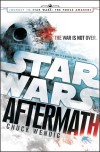The Lifecycle of Software Objects
 What I've found out from reading the Foundation and Dune series recently is that science fiction is more about the ideas than the writing itself. Asimov created a fascinating universe, but his stories were lacking; Herbert created a brilliant universe of his own, steeped with religion, politics, and power, but his characterization seemed flat and the prose could run pretty dry (which, I suppose, is pretty fitting for a series about a desert planet). It's nice when the ideas behind a particular novel support an engaging story, as well, and that's where Ted Chiang comes in.
What I've found out from reading the Foundation and Dune series recently is that science fiction is more about the ideas than the writing itself. Asimov created a fascinating universe, but his stories were lacking; Herbert created a brilliant universe of his own, steeped with religion, politics, and power, but his characterization seemed flat and the prose could run pretty dry (which, I suppose, is pretty fitting for a series about a desert planet). It's nice when the ideas behind a particular novel support an engaging story, as well, and that's where Ted Chiang comes in.This short novel is a "Does what it says on the box" sort of book, since it's about the lifecycle of software objects. Specifically, it's about the development of "digients," digital sentient beings who have the capability to learn and develop over the course of their lifetime. The digients are created by a variety of software companies who want to give the users of a virtual world like Second Life the chance to raise and care for these beings in that environment. This isn't something new in science fiction, but whereas other stories have focused on how artificial intelligence affects our world, Chiang looks at how our world affects these digients.
The story focuses on two human characters, Ana and Derek, and the digients they've adopted. It's a useful way to frame the story, since the digients continually surprise people with what they're capable of doing on their own, and Ana and Derek serve as our way to react to those moments of surprise. Plus, the digients are fairly naive (they act like small children for much of their time in the story), and their innocence requires an adult perspective to interpret and receive their message. That Ana and Derek were instrumental in the development of the digients only makes that perspective more meaningful, as they're not just surrogate parents in this story; in a sense, they are the parents.
The Lifecycle of Software Objects covers a large span of time in a short amount of narrative. Sections of the story begin with "Six months later," or "One year later," as Chiang focuses on the major points of the story without getting bogged down by the minutiae of what happens during that span of time. He tells you about how human these digients are by showing you what happens when they're accepted, when they're forgotten, and when they're suspended (which is akin to death for the digients). It's not a spoiler to tell you what to expect from the story itself, since what makes the story special is how Chiang populates it with so many sympathetic characters in such a short span of time. The human characters are less developed than the digients, but not so much that the ending won't be emotional for you.
Chiang's writing is crisp and precise. There are no wasted words, no purple prose to get in the way of him telling you about how monumental it is for Jax, Marco, and Polo to be sentient pieces of software. His style reminds me a little of George R.R. Martin's, in that it's understated. Read a random sentence from the story and it won't wow you with its power; all together, though, it becomes more than the sum of its parts, and the story is hard to put down. It took a little time to get used to the story being told in the present tense, but by page 25 or so, I was accustomed to it, and flying through the story.
I picked up this book based on an article discussing the best science fiction stories of 2014, and I'm glad that I did. I put my Unfinished Series project on hold for this (namely because this came from the library; the novella is out of print, and demanding some hefty prices on the secondary market), and I'm glad I did. If anything about the story sounds interesting to you, seek it out for yourself and read it. You won't be disappointed.






